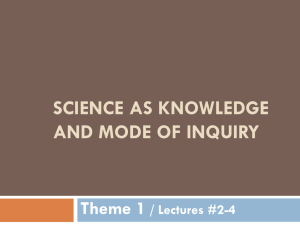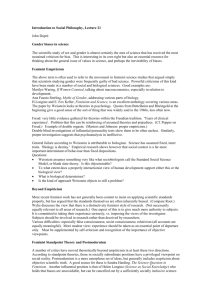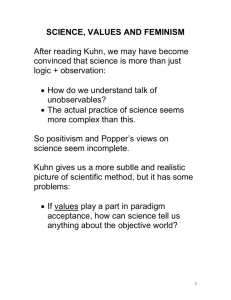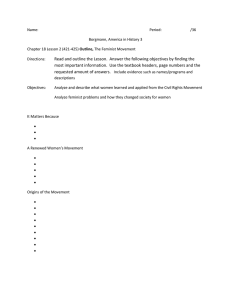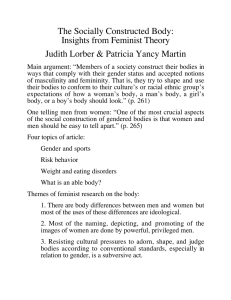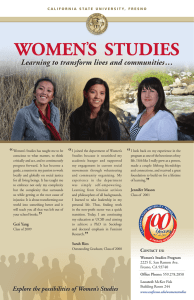Inclusion and Objectivity: Helen Longino’s Feminist Theory of Scientific Inquiry
advertisement
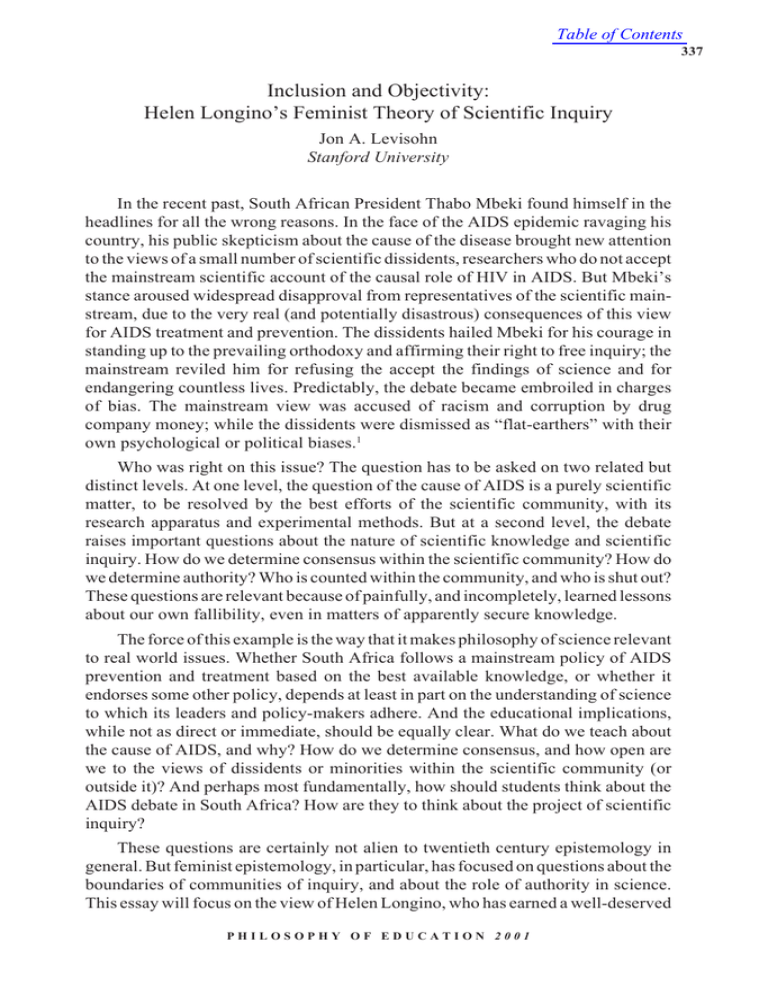
Table of Contents Jon A. Levisohn Inclusion and Objectivity: Helen Longino’s Feminist Theory of Scientific Inquiry Jon A. Levisohn Stanford University In the recent past, South African President Thabo Mbeki found himself in the headlines for all the wrong reasons. In the face of the AIDS epidemic ravaging his country, his public skepticism about the cause of the disease brought new attention to the views of a small number of scientific dissidents, researchers who do not accept the mainstream scientific account of the causal role of HIV in AIDS. But Mbeki’s stance aroused widespread disapproval from representatives of the scientific mainstream, due to the very real (and potentially disastrous) consequences of this view for AIDS treatment and prevention. The dissidents hailed Mbeki for his courage in standing up to the prevailing orthodoxy and affirming their right to free inquiry; the mainstream reviled him for refusing the accept the findings of science and for endangering countless lives. Predictably, the debate became embroiled in charges of bias. The mainstream view was accused of racism and corruption by drug company money; while the dissidents were dismissed as “flat-earthers” with their own psychological or political biases.1 Who was right on this issue? The question has to be asked on two related but distinct levels. At one level, the question of the cause of AIDS is a purely scientific matter, to be resolved by the best efforts of the scientific community, with its research apparatus and experimental methods. But at a second level, the debate raises important questions about the nature of scientific knowledge and scientific inquiry. How do we determine consensus within the scientific community? How do we determine authority? Who is counted within the community, and who is shut out? These questions are relevant because of painfully, and incompletely, learned lessons about our own fallibility, even in matters of apparently secure knowledge. The force of this example is the way that it makes philosophy of science relevant to real world issues. Whether South Africa follows a mainstream policy of AIDS prevention and treatment based on the best available knowledge, or whether it endorses some other policy, depends at least in part on the understanding of science to which its leaders and policy-makers adhere. And the educational implications, while not as direct or immediate, should be equally clear. What do we teach about the cause of AIDS, and why? How do we determine consensus, and how open are we to the views of dissidents or minorities within the scientific community (or outside it)? And perhaps most fundamentally, how should students think about the AIDS debate in South Africa? How are they to think about the project of scientific inquiry? These questions are certainly not alien to twentieth century epistemology in general. But feminist epistemology, in particular, has focused on questions about the boundaries of communities of inquiry, and about the role of authority in science. This essay will focus on the view of Helen Longino, who has earned a well-deserved PHILOSOPHY OF EDUCATION 2001 337 338 Inclusion and Objectivity place as a leading feminist theorist. I will present her view as a serious attempt to come to grips with the lessons of contemporary philosophy of science, and to try and formulate a view of scientific community and scientific objectivity which builds upon feminist insights while affirming realist intuitions. Ultimately, however, I will argue that this attempt is not successful. LONGINO’S CONTEXTUAL EMPIRICISM As opposed to other prominent feminist epistemologists, who tend to adopt a rhetoric of critical subversion of the philosophical tradition, Helen Longino situates herself within that tradition.2 Longino sees herself as developing a position — the epistemological stance she calls “contextual empiricism” — by weaving together three distinct threads: first, traditional empiricism; second, recent philosophy of science; and third, feminist analysis.3 Her starting point is traditional empiricism, which she understands as the notion that sense experience — rather than reason or intuition — is “the fundamental legitimator of knowledge claims.”4 This means two things: first, beliefs which conform to sense experience are better than their opposites; and second, factual claims must specify the observational data which support them.5 But recent philosophy of science, the second thread, has problematized traditional empiricism, especially through the introduction of two specific ideas: (a) the thesis that observations and data are unavoidably theory-laden, attributed to Thomas Kuhn and N.R. Hanson; and (b) the thesis that sets of data point towards more than one theory, attributed to Duhem.6 These two theses call the empiricist picture into question, in the following way. The empiricist picture conceives of sense experience, the raw data, confirming or disconfirming the hypothesis or theory in question. But according to the theoryladenness thesis, in actual inquiry, the data do not ever exist independently of all theory. Rather, observations themselves are made up of sense experience organized by theory, operating in the background (as it were).7 In addition, the empiricist picture suggests that the accumulation of data serves to confirm or disconfirm only one theory, that single theory which accurately expresses the scientific reality. However, the second thesis holds that any set of data may be consistent with more than one theory. Perhaps some theories are disconfirmed, but a whole range of other theories remain within the realm of possibility. If this is correct, as Longino believes that Duhem has shown, then other factors must come into play in order for scientists to select among the remaining viable theories — factors beyond the sense experience whose exclusive significance traditional empiricism celebrated. Together, then, these two theses undermine the traditional empiricist picture: “One claim challenges the stability of observations themselves, the other the stability of evidential relations.”8 The view that fully acknowledges the impact of these two theses is what Longino calls “contextual empiricism,” by which she means an empiricism that acknowledges a role in theory selection not just for “constitutive values” (simplicity, empirical adequacy) but for “contextual values” — values derived from social and cultural context — as well.9 But as Longino notes, if this is correct, “then it’s not clear what protects theory choice from subjective elements PHILOSOPHY OF EDUCATION 2001 Jon A. Levisohn hidden in background assumptions.”10 That is, by taking these two theses seriously, have we not admitted that subjective values trump objective facts in scientific inquiry? In Longino’s words: If evidential relevance is fixed by mutable background assumptions, what protects knowledge from being the arbitrary expression of subjective desires or the tool of social and personal interests?11 The solution — the magic bullet which constrains subjective influences and protects the objectivity of science — is the social nature of scientific inquiry. In the formulation of her 1990 title: “science as social knowledge.” “My conclusion,” she writes elsewhere, “is not that scientific inquiry is not objective but that the practices of inquiry are not individual but social” (ET, 263).12 In Longino’s view, this conclusion is the product of the third thread mentioned above, namely, feminist analysis: “One of the achievements of feminist analysis ... has been to expose the illusoriness of individualism and the radical interdependence of human beings.”13 But here I think that it is important to distinguish between two components of Longino’s argument: the epistemological claim about science as social knowledge and the historical claim about the source of this idea within feminist theory. The latter claim is problematic, at best, given the long history of reflection on this issue. And indeed, Longino herself at times seems to back away from the assertion (ET, 263). But this move in turn raises another question: if Longino rejects any suggestion of a distinctive female way of knowing, and if she also now withdraws her suggestion that the social nature of science is a feminist insight, then what makes her view “feminist?”14 In fact, Longino takes up this question, suggesting that we avoid talking of feminist theories as alternative epistemologies. Rather than “doing feminist epistemology,” we should instead consider “doing epistemology as a feminist,” bringing a feminist sensibility — informed by feminist research into sexism in science and motivated by feminist values — to bear on epistemological questions.15 This seems quite right. While the notion of alternative epistemologies is highly problematic, the notion of approaching normative epistemological inquiry with a heightened historical and political awareness is eminently justifiable. But notice that there is a parallel, here, between Longino’s (epistemological) theory, itself, and her characterization of scientific theories: each cannot avoid the introduction of “values.” On her view, the community of inquiry, then, functions not only to replicate experimental success, and not only to scrutinize the justification of hypotheses on the basis of data, but also to critique the values — both constitutive and contextual — which individual inquirers may employ. “Criticism of the deep assumptions that guide scientific reasoning about data is a proper part of science.”16 The background assumptions of one scientist — or one epistemologist — are available for the scrutiny of others, and so while those assumptions are unavoidable, they do not condemn inquiry to subjectivism. Two problems immediately arise. First, background assumptions can only be critiqued by those who recognize them. That is, assumptions are background assumptions precisely because they are often invisible to those who hold them; PHILOSOPHY OF EDUCATION 2001 339 340 Inclusion and Objectivity typically, though not always, only those who do not share them are in a position to recognize them and point them out. But how do we know that a community, even a community of scientists committed to critical inquiry, is in a position to do so? Second, and relatedly, certain background assumptions are held by whole communities. If this is the case, then by definition they are unavailable to critique. Science as social knowledge seems to protect us from individual subjectivism, only to defer the problem to the level of the community. These concerns motivate Longino’s next step, which is to suggest that the identification of science as social knowledge — the notion that objectivity is conditioned not by strict individual adherence to scientific method but rather by collective and communal adherence to certain standards of a scientific community — implies that “effective criticism of background assumptions requires the presence and expression of alternative points of view” within a community (ET, 266).17 Without those alternative points of view, contextual values and background assumptions go unexamined. We now come to see, therefore, that the social nature of science is not, after all, sufficient to redeem inquiry from subjectivity. Rather, only particular communities achieve objectivity, communities that fulfill certain criteria for “effective criticism.” Another way to put this is to say that Longino moves here from a descriptive account of scientific inquiry to a prescriptive, normative one: she is now in the position of claiming that any scientific community which does not fulfill the criteria that she lays out is not a real community, is not doing real science, and therefore has not achieved real objectivity.18 Before moving on to an examination of those criteria, however, it is worth pausing to notice an odd implication of this position. If it is true that her position is informed by feminist values, then a community of inquiry requires the inclusion of some others who do not share these background assumptions in order to preserve its objectivity. We are then faced with the paradoxical conclusion that feminist values demand the inclusion of non- or anti-feminist inquirers. This point is not intended as a knock-down argument, by any means, for there are several promising avenues of response that Longino might make. For example, one possible move is to differentiate between scientific theories and epistemological theories. As we shall see, however, a parallel problem emerges in scientific theories as well. THE CRITERIA OF OBJECTIVE SCIENCE Longino’s four criteria for objective research communities are as follows.19 1. There must be publicly recognized avenues for criticism, in addition to the journals and conferences that focus on new research, and this criticism ought to be as valued as original research. 2. The community of inquiry must not only acknowledge or tolerate dissent, but must actually change in response to criticism. 3. There must be publicly recognized (though not trans-historically rigid) standards for the evaluation of theories, to which both researchers and their critics adhere. PHILOSOPHY OF EDUCATION 2001 Jon A. Levisohn 4. There must be equality of intellectual authority between the members of the community, such that consensus emerges as “the result of critical dialogue in which all relevant perspectives are represented” rather than “the exercise of political or economic power or of the exclusion of dissenting perspectives.”20 According to Longino, these four criteria are necessary for the proper functioning of a scientific community, functioning which she characterizes as both “effective criticism” and “transformative criticism.” More significantly, she asserts that the very objectivity of that community’s inquiry is dependent on that transformative criticism; inquiry is objective “to the extent that it facilitates such transformative criticism” (ET, 266).21 It should be clear that these criteria represent not-so-subtle critiques of contemporary scientific institutions. It might also be apparent to some readers that there are both empirical and philosophical grounds on which to challenge these critiques — but space does not permit that discussion here. Instead, the important point to notice is that Longino clearly considers these criteria not merely as ideals, but rather as a kind of objectivity-index. “Taking these criteria as measures of objectivity, objectivity is dependent upon the depth and scope of the transformative interrogation... in any given scientific community” (ET, 268). So the way that we ought to evaluate any particular theory is directly related to the way that we evaluate the openness and diversity of the scientific community in which that theory arose and is defended. To borrow some old-fashioned philosophical jargon: the “context of discovery” is directly relevant to the “context of justification.” But why? One is tempted, at first, to offer an argument about what sorts of communities are most likely to engage in critique of fundamental background assumptions. But Longino’s point is an a priori one, not a probabilistic one. That is, she seems to suggest that one can determine, in advance, the objective validity of a particular theory on the basis of the openness and inclusivity of the community of inquiry in which it arose. But to the extent that this is an attempt to explain just why we think that good science is objective — that is, to the extent that Longino is attempting to preserve some realist intuition about the normativity of scientific knowledge — this theory misrepresents that intuition. We do not think that a theory is correct in light of our admiration for the inclusivity of the community of inquiry. That latter fact might well be deserving of admiration, and it might lead to a kind of confidence about knowledge that we would not otherwise have — especially knowledge that we typically have not inquired into ourselves. But the realist intuition is that a theory is correct because, at some level, this is the way the world is; it is an intuition about the world, not about a scientific community.22 WHOSE CRITIQUE? WHY? So one concern about Longino involves her attempt to honor the realist intuition. But another concern involves the way in which the theory is operationalized. Longino has argued that certain contextual values operate as background assumptions, and that such assumptions are unavoidable: “scientific inquiry should be expected to display the deep metaphysical and normative commitments of the PHILOSOPHY OF EDUCATION 2001 341 342 Inclusion and Objectivity culture in which it flourishes.”23 But these commitments come in all shapes and sizes. Some of them are idiosyncratic and personal, subject to identification and modification through the critical intervention of peers. Others are more widely held, “commitments of the culture.” How are we supposed to determine who stands outside the culture in question in order to gain that person’s critical perspective? In answer to this latter question, Longino clearly has in mind the familiar criteria of race, class, and gender. At times, she writes in a retrospective, descriptive mode: The long-standing devaluation of women’s voices and those of racial minorities meant that such assumptions [about sex and gender structure, and about race] have been protected from critical scrutiny (ET, 268). And in fact, Longino herself has contributed to the laborious process of uncovering those assumptions.24 But at other times, Longino turns the corner from the descriptive account of the uncovering of, for example, sexist and racist assumptions, to a prescription for scientific objectivity: “[Objectivity] is secured through assuring the inclusion of all socially relevant perspectives in the community engaged in the critical construction of knowledge.”25 I take it that “socially relevant” is meant to indicate those collections of individuals that are recognized as social groupings in our culture. Women count as such a group; green-eyed lefties do not. In other words, Longino’s argument leads her to advocate for a greater inclusiveness towards the politically disenfranchised. It should be clear that Longino is wrestling with what is, to be sure, a vexing problem. Those who are sympathetic to feminist concerns see what she sees: that feminists have raised important issues and offered important competing interpretations in numerous fields of inquiry, not only in the humanities, but in the social sciences and physical sciences as well. Feminist scholars have exposed masculinist biases in these fields, biases that are startling precisely because they have gone unnoticed for so long. When pointed out, many of those assumptions seem ludicrous, at best, and diabolical at worst. But the philosophical questions remain: How is it that feminists have come to see these assumptions and to point them out to the community? What is it that makes these assumptions invalid. And how can we achieve objective knowledge in the future? Longino’s view is that inclusive communities of inquiry produce more objective knowledge. The argument that I have pursued here suggests that her view begs the important questions. It seems right that those who do not share a bias can notice that bias in the work of others more easily, but we have no way of determining, a priori, which bias results in a distortion and which is the “correct” one. If objectivity is determined by the degree of inclusivity of the scientific community, why should feminist communities with feminist biases come up with knowledge that is more objective than non-feminist communities with non- (or anti-) feminist biases? Alternatively, must it be the case that feminist inquiry is only objective when it occurs within a community that includes anti-feminists? As above, that paradoxical conclusion seems strained. The questions become even harder when we consider real cases of scientific inquiry such as the example at the beginning of this essay. On Longino’s account, PHILOSOPHY OF EDUCATION 2001 Jon A. Levisohn the mainstream AIDS research community depends upon a set of unavoidable background assumptions to guide its theory choice; so far so good. But can anyone confidently assert that these background assumptions are exclusive, either racially or otherwise? Such an a priori claim seems unjustified, and even an empirical claim — subject to confirmation by the introduction of solid evidence — seems implausible. Furthermore, in Longino’s view, the very fact that the mainstream community has excluded the dissenting views from consideration constitutes evidence of the absence of objectivity. This is not simply a matter of choosing one theory over others, and it’s not a matter of being less likely to come up with objective theories because of a certain exclusivist tendency among scientists. Rather, in some sense, the AIDS research community earns a lower score on the objectivity-index by virtue of its practice of exclusion, and therefore its theory is less objective as well. MBEKI, AGAIN By the middle of the year 2000, Mbeki backed off of his position, and apparently accepted the mainstream view of HIV as the cause of AIDS. Was he convinced by the merits of the arguments? Or was he bullied into giving up his unpopular position, coerced by the quantitatively greater and qualitatively more authoritative mainstream of science, silenced by domination? The answer seems to be the latter: Mbeki seems to have succumbed to intense pressure brought to bear by various international agencies. So what are we to think about this community of scientific inquiry, a community that subdues its opponents through the exercise of power? When we are happily teaching our students about the rationality of science, about its celebration of free and open inquiry in the pursuit of consensus, what are we to tell them about the case of President Mbeki? One possible position is that such an exercise of power is morally justified because of the high stakes involved. We (or our students) might say that democratic practices have to take a back seat when lives are at stake. But as it stands, this is a dangerous argument to make. What is missing is some acknowledgement that the exercise of power is carried out on behalf of a truth claim that has some special status. That is: we want to be able to say that the scientific community is justified in imposing its view not simply because the question has vital importance but because their views are correct, or as correct as scientific views can ever be. We could be wrong about this, of course, and if we are, we might find ourselves responsible for bringing about a human tragedy. But we refuse to sit on our hands and dither about scientific fallibility when we firmly believe that our knowledge can save lives. It should be clear that this is not an argument against inclusion. It is, rather, an argument against the specific argument for inclusion that Longino offers — an argument that asks objectivity to serve as the rationale for inclusion — and more broadly, against her account of scientific objectivity. In educational contexts, therefore, we should advocate for inclusion in science, and we should promote objectivity (and affirm the realist intuitions that support it), but we should not expect the former to do the work of the latter. It may very well be the case that exclusion of some group results in an incorrect theory based on flawed background assumptions, and that the inclusion of a perspective into the scientific community allows us PHILOSOPHY OF EDUCATION 2001 343 Inclusion and Objectivity 344 to critically evaluate those assumptions in a way not previously possible. Fallibilism certainly demands vigilance, in both our practice and our teaching of science. But there is no way of determining in advance what the flawed assumptions may be, or of prescribing what specific kinds of inclusionary practices will remedy them. Moreover, in addition to this worry about Longino’s prescriptions, I have argued as well that her description of scientific objectivity misses the mark, for our realist intuitions are not simply approving assessments of the inclusivity of the scientific community. By the same token, these intuitions are not undermined by the exclusionary practices exercised, for example, against the AIDS dissidents. Longino clearly wants to hold on these intuitions, in order to avoid relativist conclusions based on the infiltration of values into theory-selection.26 She writes about the critical re-examination of assumptions and values; it is clear that she believes feminist science and philosophy has offered, and will continue to offer, just such a critique of the mainstream inquiries of the scientific community. And we can agree that our science is better for it. I conclude, however, that the epistemological basis for this critique remains to be worked out. For response see essay by McCarthy 1. Information on Mbeki and AIDS in South Africa is available from numerous sources, of which the following are a fairly representative sample: Tom Masland and Patricia King, “Flirting with strange ideas,” Newsweek, 17 April 2000, 36; Paul Salopek, “Mbeki’s AIDS tactics baffle scientists,” Toronto Star, 23 April 2000; Rachel L. Swarns, “Mbeki details quest to grasp South Africa’s AIDS disaster,” New York Times, 7 May 2000 section 1, 17; “Mbeki’s about face,” Global News Wire, 2 June 2000. 2. See, for example, Sandra Harding, “Rethinking standpoint epistemology: What is ‘strong objectivity’?” in Feminist Epistemologies, ed. Alcoff and Potter (New York: Routledge, 1993), 49-82. Compare E. B. Cole, Philosophy and Feminist Criticism (New York: Paragon House, 1993). 3. Helen Longino, “Feminism and philosophy of science,” Journal of Social Philosophy 21 (1990): 150. 4. Ibid. 5. On the other hand, Longino clarifies that by “empiricism” she does not intend any thesis about meaning, only about knowledge. See Helen Logino, Science as Social Knowledge: Value and Objectivity in Scientific Inquiry (Princeton: Princeton University Press, 1990), 219. This text will be cited as SSK for all subsequent references. 6. Helen Longino, “Subjects, power, and knowledge: Description and prescription in feminist philosophies of science,” in Feminism and Science, ed. E.F. Keller and H.E. Longino (Oxford: Oxford University Press, 1996), 271. More generally, see Longino, SSK, chapters 2-3. 7. This does not imply a simple circularity in all scientific reasoning, of course, because the theory or theories that organize the sense experience are usually not identical to the theory under investigation. 8. Longino, “Subjects, power, and knowledge,” 271. 9. See Helen Longino, “Can there be a feminist science?’, Hypatia 2, no. 3 (1987): 54; Longino, “Feminism and philosophy of science,” 151; and Helen Longino, “Essential tensions–phase two: Feminist, philosophical, and social studies of science,” in A Mind of One’s Own: Feminist Essays on Reason and Objectivity, ed. Louise M. Antony and Charlotte Witt (Boulder: Westview Press, 1993), 263. This essay will be cited as ET for all subsequent references. For a closer examination of Longino’s use of these two different kinds of values, see Francis Schrag, “The feminist critique of science and educational inquiry,” Philosophy of Education 1998, ed. S. Tozer (Urbana, IL: Philosophy of Education Society, 1998), 82-90, (and the response to this paper, L.P. McCarty, “Tattooing the bubble: Schrag and Longino on science, feminism, education,” Philosophy of Education 1998), 91-4. However, this feature of Longino’s view will not play a significant role in my arguments. 10. Longino, “Subjects, power, and knowledge,” 271. 11. Longino, “Feminism and philosophy of science,” 151. PHILOSOPHY OF EDUCATION 2001 Jon A. Levisohn 12. See SSK, 67 ff., for an elaboration of what it means to say that science is social. 13. Longino, “Feminism and philosophy of science,” 152. 14. Longino, “Can there be a feminist science?,” 61. 15. Helen Longino, “In search of feminist epistemology,” The Monist 77, no. 4 (1994): 475. 16. Longino, “Can there be a feminist science?,” 56. 17. Also see SSK, 80, which focuses on greater and smaller “numbers” of points of view; this raises the question of how points of view are to be individuated. 18. Note, here, that “objectivity” refers to a quality of inquiry (and of the communities that carry out that inquiry), rather than a quality of knowledge itself. See Longino, SSK, 62-3, where she distinguishes between the two senses. At the same time, if objectivity of knowledge is to mean something other than simply an appeal to a scientific realist metaphysics, then it must depend upon or in some way relate to objectivity of inquiry. See also SSK, 200-1, where Longino argues for a distinction between objectivity and truth. 19. She repeats these criteria in various places, with some slight variations. See SSK, 76; ET, 267; and “Subjects, power, and knowledge,” 273. 20. Longino, “Subjects, power, and knowledge,” 273. 21. This is a slight adaptation of her earlier formulation in terms of the objectivity of the community (SSK, 76). 22. Note that this realist intuition does not necessarily result in a strong metaphysical realism. Nor does it necessarily demand a “correspondence theory of truth.” The point here is that if one wishes to preserve the realist intutition, as Longino does(see, for example, SSK, 82) — rather than suggesting that we give it up, in a Rortian fashion — then one must not reduce it to an intutition about scientific communities. 23. Longino, “Can there be a feminist science?,” 52. 24. See Ruth Doell and Helen Longino, “Sex hormones and human behavior: A critique of the linear model,” Journal of Homosexuality 15, nos. 3/4 (1988): 55-79. In this paper in the field of behavioral neuroendocrinology, Doell and Longino offer a compelling (to the layperson) alternative interpretation of human behavioral data which results in a competing theory of the relationship between behavioral sex differences and prenatal gonadal hormone secretion. See also SSK, chapters 6-7. 25. Longino, “Feminism and philosophy of science,” 152. 26. She hopes “to develop an account of scientific knowledge that reconciles the role of values in shaping our knowledge of the world with our need for models and theories that are not simply a projection of our fears and desires” (Helen Longino, “To see feelingly: Reason, passion, and dialogue in feminist philosophy,” in Feminisms in the Academy, ed. Stanton and Stewart, Ann Arbor: University of Michigan Press, 1995). See also SSK, 37. More generally, it should certainly be clear that Longino would share the concerns expressed here about Mbeki; compare her criticism of creationism and Lysenkoism in SSK, 15. PHILOSOPHY OF EDUCATION 2001 345
